人教版九年级英语上册(全册)课件汇总
人版英语九年级(上册)Unit3Couldyoupleasetellme全课件(共222张PPT)
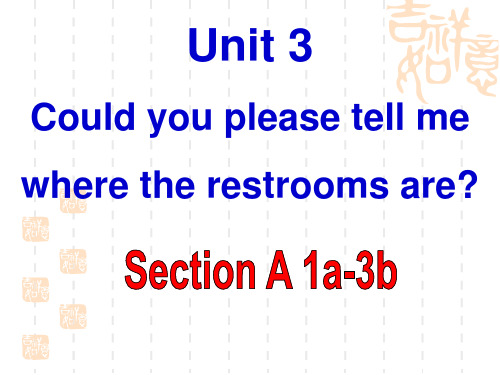
Turn left.
Turn right.
Go / Walk along … until … Go past …
Where is ?
A
next to …
on the right
A
B between … and …
1c Make conversations using the information in 1a. Then talk about your own town/ city.
the end. 沿着这条街向前走,在路的尽头你会找到那个公 园.
Could you please tell me where we can …?
library
Where can we …? get some magazines
Could you please tell me where we can …?
book store
Where can we …? make a telephone call 打
He Wei: That's right. In China, we normally say "toilet" or "washroom" in English. Anyway, they’re over there.
Alice: OK. I’ll be quick! He Wei: No problem. You don’t need to rush!
Unit 3
Could you please tell me where the restrooms are?
Objectives
1. Learn how to ask for information politely
人教版九年级全册Unit1课件 (共25张PPT)

listening to music when learning
sleeping in class
talking with other students in class
They are not good habits for learning English.
1. What does “Practice makes perfect.” mean? Keep practicing. 2. If successful learners make mistakes, what do they often do? They learn from mistakes.
Read, study and learn about everything imporant in your life
Read Paragraph 3 and answer the questions.
Practicing and learning from mistakes Good learners think about what they are good at and what they need to practice more. Remember, “Use it or lose it.” Even if you learn something well, you will forget it unless you use it. “Practice makes perfect.” Good learners will keep practicing what they have learned, and they are not afraid of making mistakes. Alexander Graham Bell did not invent the telephone overnight. He succeeded by trying many times and learning from his mistakes.
人教版九年级英语全一册全册完整课件
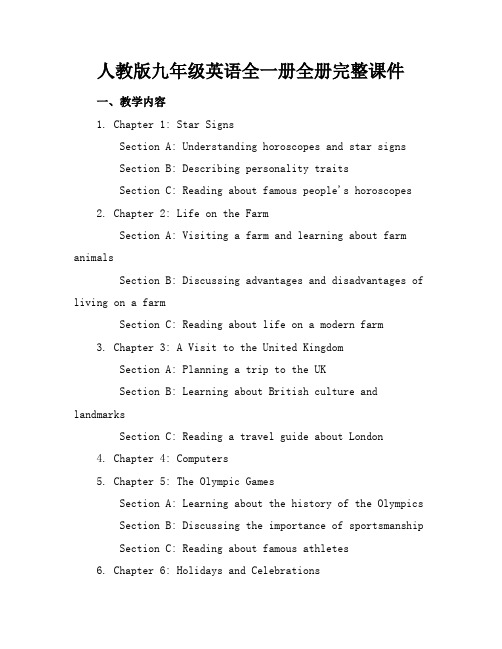
人教版九年级英语全一册全册完整课件一、教学内容1. Chapter 1: Star SignsSection A: Understanding horoscopes and star signsSection B: Describing personality traitsSection C: Reading about famous people's horoscopes2. Chapter 2: Life on the FarmSection A: Visiting a farm and learning about farm animalsSection B: Discussing advantages and disadvantages of living on a farmSection C: Reading about life on a modern farm3. Chapter 3: A Visit to the United KingdomSection A: Planning a trip to the UKSection B: Learning about British culture and landmarksSection C: Reading a travel guide about London4. Chapter 4: Computers5. Chapter 5: The Olympic GamesSection A: Learning about the history of the Olympics Section B: Discussing the importance of sportsmanship Section C: Reading about famous athletes6. Chapter 6: Holidays and CelebrationsSection A: Talking about favorite holidays and celebrationsSection B: Learning about different cultural traditionsSection C: Reading about holiday customs around the world二、教学目标1. 学生能够理解和运用所学词汇和句型,描述个人和事物特点。
人教版九年级上册英语全册课件PPT
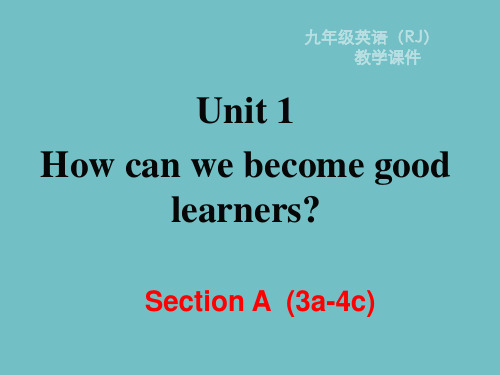
While-reading
How I Learned to Learn English
Last year, I did not like my English class. Every class was like a bad dream. The teacher spoke so quickly that I did not understand her most of the time. I was afraid to ask questions because of my poor pronunciation. I just hid behind my textbook and never said anything.
1) discover v. 发现
2) discover/ invent /find/ /find out/ create 的区别
①I discovered (that) she was a good cook. discover指_________ ,某种_________ ,而以前未被
发现的事物或未为人所知的东西。
九年级英语(RJ) 教学课件
Unit 1 How can we become good
learners?
Section A (3a-4c)
学习目标
➢ Key words & phrases:
expression, discover, secret, grammar, repeat, note, pal, physics, chemistry , memorize, pattern
人教版九年级英语全一册全册完整课件
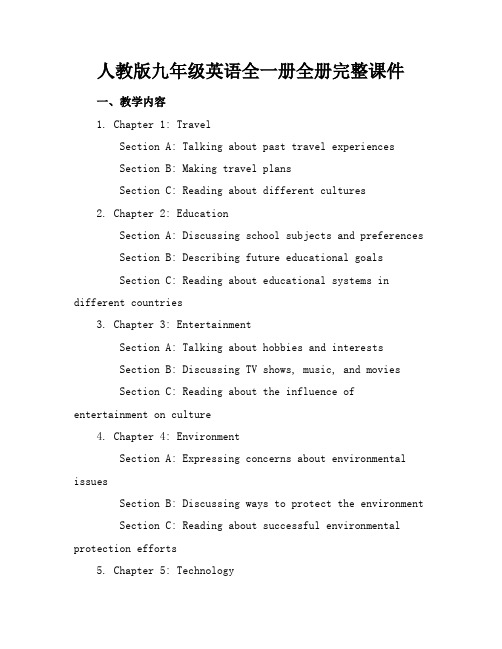
人教版九年级英语全一册全册完整课件一、教学内容1. Chapter 1: TravelSection A: Talking about past travel experiencesSection B: Making travel plansSection C: Reading about different cultures2. Chapter 2: EducationSection A: Discussing school subjects and preferences Section B: Describing future educational goalsSection C: Reading about educational systems in different countries3. Chapter 3: EntertainmentSection A: Talking about hobbies and interestsSection B: Discussing TV shows, music, and moviesSection C: Reading about the influence of entertainment on culture4. Chapter 4: EnvironmentSection A: Expressing concerns about environmental issuesSection B: Discussing ways to protect the environment Section C: Reading about successful environmental protection efforts5. Chapter 5: TechnologySection A: Using technology in daily lifeSection B: Discussing the advantages and disadvantages of technologySection C: Reading about technological innovations6. Chapter 6: HealthSection A: Talking about exercise and healthy habits Section C: Reading about the importance of mental health7. Chapter 7: JobsSection A: Discussing dream jobs and career aspirationsSection B: Describing job responsibilities and qualificationsSection C: Reading about successful entrepreneurs8. Chapter 8: CultureSection A: Exploring traditional festivals and customsSection B: Comparing different cultures and promoting cultural understandingSection C: Reading about cultural exchange programs9. Chapter 9: SafetySection A: Talking about safety rules and precautions Section B: Discussing emergencies and natural disastersSection C: Reading about safety education10. Chapter 10: Life GoalsSection A: Sharing life goals and aspirationsSection B: Setting realistic goals and planning for the futureSection C: Reading about inspirational individuals二、教学目标2. Cultivate students' ability to read and understand different text types.3. Enhance students' awareness of cultural diversity and promote cultural understanding.三、教学难点与重点1. Mastering target vocabulary and sentence structures.3. Improving speaking and writing skills throughpractical activities and reallife situations.四、教具与学具准备1. Multimedia projector2. Whiteboard and markers3. Handouts with vocabulary lists, reading materials, and exercises4. Recording devices for listening activities五、教学过程1. Warmup: Engage students in a brief discussion about the topic of the day.2. Presentation: Introduce new vocabulary and sentence structures through reallife examples and practice dialogues.3. Practice: Provide students with practical activities, such as roleplays, group discussions, and writing exercises.4. Listening and speaking activities: Play audio recordings, and guide students to practice their listening and speaking skills.5. Reading: Assign reading materials and guide students through skimming, scanning, and intensive reading exercises.6. Grammar focus: Explain and practice targeted grammar points.7. Production: Encourage students to create their own dialogues, presentations, or written pieces based on the topic.8. Summary: Review key points and answer students' questions.9. Homework assignment: Provide homework tasks and answer any questions.六、板书设计The board will display key vocabulary, sentence structures, grammar points, and a visual representation of the lesson's structure.七、作业设计1. Write a paragraph about your favorite hob, including why you enjoy it and how often you engage in it.Answer: (Student's paragraph)2. Create a dialogue between two friends discussing their future educational goals.Answer: (Student's dialogue)3. Read the article about successful environmental protection efforts and summarize the main points.Answer: (Student's summary)八、课后反思及拓展延伸Reflect on the effectiveness of teaching methods and student engagement. Consider incorporating additional resources, such as online videos, interactive games, or group projects, to enhance students' understanding and practical application of the topics covered. Encourage students to explore related topics beyond the classroom, fostering a love for lifelong learning.重点和难点解析1. 教学内容的覆盖与组织2. 教学目标的具体化3. 教学难点与重点的确定4. 教学过程的细节设计5. 板书设计的有效性6. 作业设计的针对性与实践性一、教学内容的覆盖与组织教学内容应全面覆盖教材的章节,同时要注重内容的逻辑顺序和递进关系。
人教新目标版九年级英语全册课件Unit 1 How can we become good learn
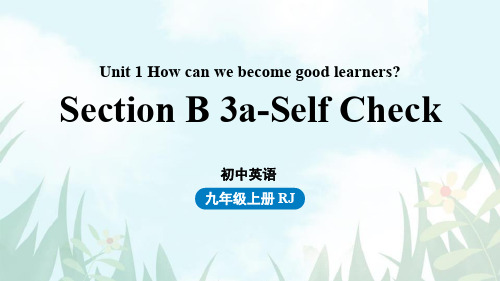
Unit 1 How can we become good learners? Section B 3a-Self Check初中英语九年级上册 RJLearning goalsWriting: Write a letter about learning English.What good ways of learning English we have learnt in thisunit? Warming upüby watching English programsüby asking the teacher for helpüby doing exercise s and reading a lot üby reading the textbooküby making word cardsüby writing to a tape and repeating out loudüby working with friends / a groupI learnEnglish …üby explaining the information to anotherstudentüby writing for just the key words üby trying many times and learning frommistakesüby writing e-mails to pen palsI learnEnglish …3a Your friend wants to improve his/her English and asks you for help. What are the three best ways to learn and why? Make some notes in the chart.Best ways to learn Reasons Examples1. Being interested in what you do If you are interested insomething, your brain willbe more active and...If you like music, you canlearn English by listeningto English songs.2.3.………You can choose information from the summary of this unit.Exchange your chart with your partner, and discuss it.I don’t think this sentence “you canlearn many new words and see howto use” is right.Emm, maybe it can be: you canlearn many new words and see howthey are used.Suggested answers:Best ways to learn Reasons Examples1. Being interested in what you do If you are interested in something, yourbrain will be more active and...If you like music, you can learnEnglish by listening to English songs.2. Reading English books If you read English books that are well-written and show good use of thelanguage, you can learn many newwords and see how they are used.If you like to read, you can learn English by reading well-known storybooks like Harry Potter or simplified versions of famous books like Pride and Prejudice.3. Watching English movies If you watch English movies, you canpractice listening to natural speech andyou can use the storyline, body language,actions and facial expressions toimprove your understanding.If you like to watch movies, you can learn English by watching popular movies like Hunger Games and Kung Fu Panda.………3b Write a letter to your friend. Give him/her some advice about the best ways to learn English. Use your notes in 3a.How to write a letter:Dear …,There are three ways …The first way is/First, …The second way/Secondly, ...The third way/Finally, …Yours sincerely,…3b Write a letter to your friend. Give him/her some advice about the best ways to learn English. Use your notes in 3a. Try to use the following expressions:•There are three good ways to …•I think you should ...•If you do this, you will ...•It is also a good idea to ... because ...•You could try to improve your English by ...•This will help you to ...3b Sample writing:Dear Wenxin,There are three good ways to learn English. One way is being interested in what you are doing. If you are interested in something, your brain will be more active and you will be more focused. If you like music, I think you should listen to English songs. If you do this, you will be able to improve your pronunciation.It is also a good idea to read English books because well-written books can teach you many new words and how they are used. You could try to improve your English by watching English movies. This will help you to improve your listening and speaking skills and you will have a chance to listen to natural speech.I hope these three ways will work well for you!Yours sincerely,Li Ting1. Fill in the blanks with the words in the box.practice develop remember prepare take notes until worry about everything Are you stressed out each time you have a test? You don’thave to be if you ________ smart study skills. Rememberto __________ in class and review them on your own or with friends after class.develop Self Checktake notesThen ________ what you learned by doing exercisess.try to study and_________ information bit by bitinstead of waiting _________ the last minute tostudy_________ at once. If you ________well for a test, then there’s nothing to _____________!practice develop remember prepare take notes until worry about everythingpractice remember until everything prepare worry aboutLanguage points1. remember (教材P8 Self Check)remember to do & remember doing remember to do记得要做某事(某事未做)remember doing记得做过某事(某事已做)Ø Remember to write to us when you get there.ØI remembered closing the door.ØDon’t forget to turn off the light when you leave the room.ØHe forgot handing in his homework.forget to do & forget doing 类似表达:forget to do忘记要去做某事(某事未做)forget doing 忘记做过某事(某事已做)ØWhen you’re stressed out, you can listen to music.2. Are you stressed out each time you have a test? (教材P8 Self Check ) be stressed out 紧张的;焦虑的3. … review them on your own or …(教材P8 Self Check )one’s 要用形容词性物主代词。
人教版九年级上册英语课件:Unit 1 Section A(3a-4c) (共22张PPT)
• 5.【辨析】as well、also、too与either。四者都可意为“也,还”, 但用法有区别。(1)as well是副词短语,常用于口语中。它相当于too, 通常位于肯定句句末,多与and和but搭配使用。(2)also通常位于be 动词、助动词和情态动词之后,实义动词之前。(3)too比also更口语 化,常用于肯定句中,既可放在句中,也可放在句末。常用逗号与句 子其他成分隔开。(4)either用于否定句句末。
• _____W__h_a_t/_H_o_w__ ______a_b_o_ut__going fishing this weekend?
• 5.My brother is only five years old,but he can play the piano very Awlethlol.ugh/Though
• 4.Taking no_t_e_s_____ is a good way to learn English.
• 5.His favourite subject isph_y_s_i_cs_________(物理) and he is very
good at it.
grammar
• 6.I find it hard to learn English _____________(语法).
• ③use是动词,意为“使用”,在句中作谓语。
基础训练
• 一、根据句意及首字母或中文提示写出单词。
• 1.He revealed (泄露) thes_ec_r_e_t________ (秘密) by accident.
• 2.He _____d_is_c_o_v_e_re_d____ (发现) a beautiful island. • 3.【山东烟台中考】John is interested cihnem__is_tr_y___________(化学).
Unit 1 课件(共35张PPT) 人教版九年级全册
1) It is no use/ good / useless + doing... 2) It is a waste of time + doing ... 3) It is fun + doing ... 在以上结构中常用动名词作主语。 It’s no use crying over spilt milk. 覆水难收。 It is fun playing with children. 和孩子们一起玩真好。
New words
Unit 1 Section A (Grammar Focus-4c)
repeat /rɪˈpiːt/
v.重复;重做
note /nəʊt/
n. 笔记;记录 v.注意;指出
pal /pæl/ n.朋友;伙伴 physics /ˈfɪzɪks/ n. 物理;物理学
chemistry /ˈkemɪstri/
A. playing B. to play C. play
Textbook
Unit 1 Section A (Grammar Focus-4c)
4a Match the questions and answers.
1. How do you practice speaking?
a. By watching English programs.
A. tell B. to tell C. telling
Grammar Focus
Unit 1 Section A (Grammar Focus-4c)
2. 用作宾语 1)作动词的宾语 常见的此类动词有:practise, understand, worry about, finish, give up, keep, keep on, look forward to, mind, miss, enjoy, depend on, cannot help, suggest, pay attention to, think about, succeed in, be used to, get used to, put off,等。
人教新目标版九年级英语全册课件Unit 1 How can we become good learn
Suggested answers:
Best ways to learn
1. Being interested in what you do
Reasons
you can use the storyline, body language, movies like Hunger Games and
actions and facial expressions toຫໍສະໝຸດ Kung Fu Panda.
improve your understanding.
…
…
…
3b Write a letter to your friend. Give him/her some advice about the best ways to learn English. Use your notes in 3a. How to write a letter: Dear …, There are three ways … The first way is/First, … The second way/Secondly, ... The third way/Finally, …
Language points 1. remember (教材P8 Self Check) remember to do & remember doing remember to do 记得要做某事(某事未做)
remember doing 记得做过某事(某事已做) ➢ Remember to write to us when you get there.
(新人教版)英语九年级全册:Unit-2-全单元ppt课件(125页)
__________
4. 飞起; 向上飞
____________up
5. 摆开; 布置
lay__________
6. 回来; 返回
come__________
答案: 1. 呈……的形状 2. 击落 3. 结果 4. fly 5. out
6. back
Ⅲ. 句型填词 1. 一天晚上, 他发现月亮是如此亮和圆以至于他能够看到在那 里的妻子。 One night, he__________ __________ the moon was__________ bright and round__________ he could see his wife there. 2. 泼水节多么有趣啊! __________ fun the Water Festival is! 答案: 1. found that; so; that 2. What
A. 端午节 B. 元宵节 C. 泼水节 D. 春节
Ⅲ. 句型填词 1. ——关于端午节你最喜欢什么? —__________ __________ you__________ __________ about the Dragon Boat Festival? ——我最喜爱竞赛。我认为观看它们很有乐趣。 —I love the races. I think that__________ __________ __________ to watch. 答案: What do; like best; they are fun
Ⅱ. 单项选择
1. —Did you see the film last night?
—Yes, I did. And I think______it’s fun to watch.
- 1、下载文档前请自行甄别文档内容的完整性,平台不提供额外的编辑、内容补充、找答案等附加服务。
- 2、"仅部分预览"的文档,不可在线预览部分如存在完整性等问题,可反馈申请退款(可完整预览的文档不适用该条件!)。
- 3、如文档侵犯您的权益,请联系客服反馈,我们会尽快为您处理(人工客服工作时间:9:00-18:30)。
in 2a and 2b.
Have you ever studied with a group? Yes, I have. I’ve
learned a lot that way.
Let’s talk about the best ways to learn English.
How do they study English?
They study English by …
They study English by watching English movies.
How do they study English?
They study English by working with friends.
1b Listen. How do these students study for a test?
Write letters from 1a above.
1b Listen. How do these students study for a test? Write letters from 1a above.
Unit1 Words and Expressions
How do you study English? Do you study English by the following ways?
I study English by working with friends.
I study English by making word cards.
Yes, it helps to improve my writing skills and know a lot about America.
practice pronunciation?
adv. 大声地; 出声地
5 ____ Have you ever studied with a group?
n. 发音
2b Listen again. Match each answer
below with a question above.
a. Yes, I have. I’ve learned a lot that way. b. Oh, yes. It really improves my
_b__ 1. Meiping __e_ 2. Peter _d__ 3. Tony
How does she study English?
Her English is very good. Do you know how she studies English? She studies English by…
I study English by asking the th n. 课本 by reading the textbook.
I study English by working with a group.
I study English by listening to tapes.
They study English by practising with foreigners.
How does he study English?
He studies English by making word cards.
He studies English by reading the textbook.
1a Check the ways you study English.
Then add other ways you
sometimes study.
___ a. by working with friends. ___ b. by making word cards. ___ c. by reading the textbook. ___ d. by listening to tapes ___ e. by asking the teacher for help. …
Do you learn English by watching movies?
Yes, it’s a very interesting way.
No, it’s too hard to understand spoken English.
What about writing letters to a pen pal in America?
speaking skills. c. I do that sometimes. I think it helps. d. No. It’s too hard to understand spoken
English.
Keys: 1. __d__ 2. __b__ 4. __c__ 5. __a__
2c Make conversations
watching videos?
2 ____ Do you have conversations with
friends in English? n. 交谈; 谈话
3 ____ What about listening to tapes?
4 ____ What about reading aloud to
How do you
I study by working with
study for a test? a group.
How do you study for a test?
I study by…
2a Listen and check the
questions you hear.
1 ____ Does anyone learn English by
How does he study English?
He studies English by listening to tapes.
He studies English by asking the teacher for help.
Make conversations about
1c
how you study for a test.
